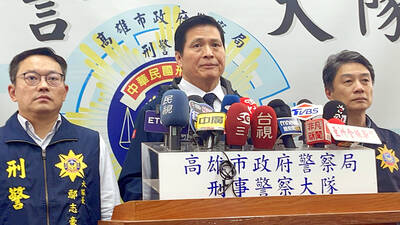The Ministry of Labor (MOL) and the Ministry of Health and Welfare have outlined 12 scenarios where employers must take action in response to an employee being sexually harassed by a member of the public.
Huang Wei-chen (黃維琛), director of the MOL’s Department of Labor Standards and Equal Employment, said yesterday that that while the Gender Equality in Employment Act (性別平等工作法) regulates harassment by employees, harassment against employees by third parties is covered by the Sexual Harassment Prevention Act (性騷擾防治法).
Many kinds of sexual harassment against employees by members of the public can be difficult for employers to investigate, making it necessary for the ministries to outline the 12 interpretive cases covered under the Sexual Harassment Prevention Act, Huang said.

Photo: Lee Chin-hui, Taipei Times
These include public transportation workers being harassed by passengers at their duty stations, medical staff harassed by patients or their families at medical institutions, personal care attendants harassed by the recipients of their services or their families, or security guards harassed by residents, delivery people or visitors.
Verbal or text abuse of customer service operators or social media managers is also considered harassment under the Sexual Harassment Prevention Act, Huang added.
Employers must provide counseling, medical assistance and other forms of support to employees in these scenarios, he said.
However, Wu Tzu-ying (吳姿瑩), executive secretary of the civil society group Modern Women’s Foundation, said that it would be better if the existing regulations in the Gender Equality in Employment Act were clarified, as the ministries’ interpretations might not be accepted by a court.
Wu also expressed concerns that clearly defined cases of sexual harassment might also mislead employers to believe that they would not need to step up prevention measures because administrative powers have already stepped in.
Employers should be provided with more education on their responsibilities to prevent this, she added.

Twenty-four Republican members of the US House of Representatives yesterday introduced a concurrent resolution calling on the US government to abolish the “one China” policy and restore formal diplomatic relations with Taiwan. Led by US representatives Tom Tiffany and Scott Perry, the resolution calls for not only re-establishing formal relations, but also urges the US Trade Representative to negotiate a free-trade agreement (FTA) with Taiwan and for US officials to advocate for Taiwan’s full membership in the UN and other international organizations. In a news release announcing the resolution, Tiffany, who represents a Wisconsin district, called the “one China” policy “outdated, counterproductive

Actress Barbie Hsu (徐熙媛) has “returned home” to Taiwan, and there are no plans to hold a funeral for the TV star who died in Japan from influenza- induced pneumonia, her family said in a statement Wednesday night. The statement was released after local media outlets reported that Barbie Hsu’s ashes were brought back Taiwan on board a private jet, which arrived at Taipei Songshan Airport around 3 p.m. on Wednesday. To the reporters waiting at the airport, the statement issued by the family read “[we] appreciate friends working in the media for waiting in the cold weather.” “She has safely returned home.

ON PAROLE: The 73-year-old suspect has a criminal record of rape committed when he was serving in the military, as well as robbery and theft, police said The Kaohsiung District Court yesterday approved the detention of a 73-year-old man for allegedly murdering three women. The suspect, surnamed Chang (張), was arrested on Wednesday evening in connection with the death of a 71-year-old woman surnamed Chao (趙). The Kaohsiung City Police Department yesterday also unveiled the identities of two other possible victims in the serial killing case, a 75-year-old woman surnamed Huang (黃), the suspect’s sister-in-law, and a 75-year-old woman surnamed Chang (張), who is not related to the suspect. The case came to light when Chao disappeared after taking the suspect back to his residence on Sunday. Police, upon reviewing CCTV

TRUMP ERA: The change has sparked speculation on whether it was related to the new US president’s plan to dismiss more than 1,000 Joe Biden-era appointees The US government has declined to comment on a post that indicated the departure of Laura Rosenberger as chair of the American Institute in Taiwan (AIT). Neither the US Department of State nor the AIT has responded to the Central News Agency’s questions on the matter, after Rosenberger was listed as a former chair on the AIT’s official Web site, with her tenure marked as 2023 to this year. US officials have said previously that they usually do not comment on personnel changes within the government. Rosenberger was appointed head of the AIT in 2023, during the administration of former US president Joe